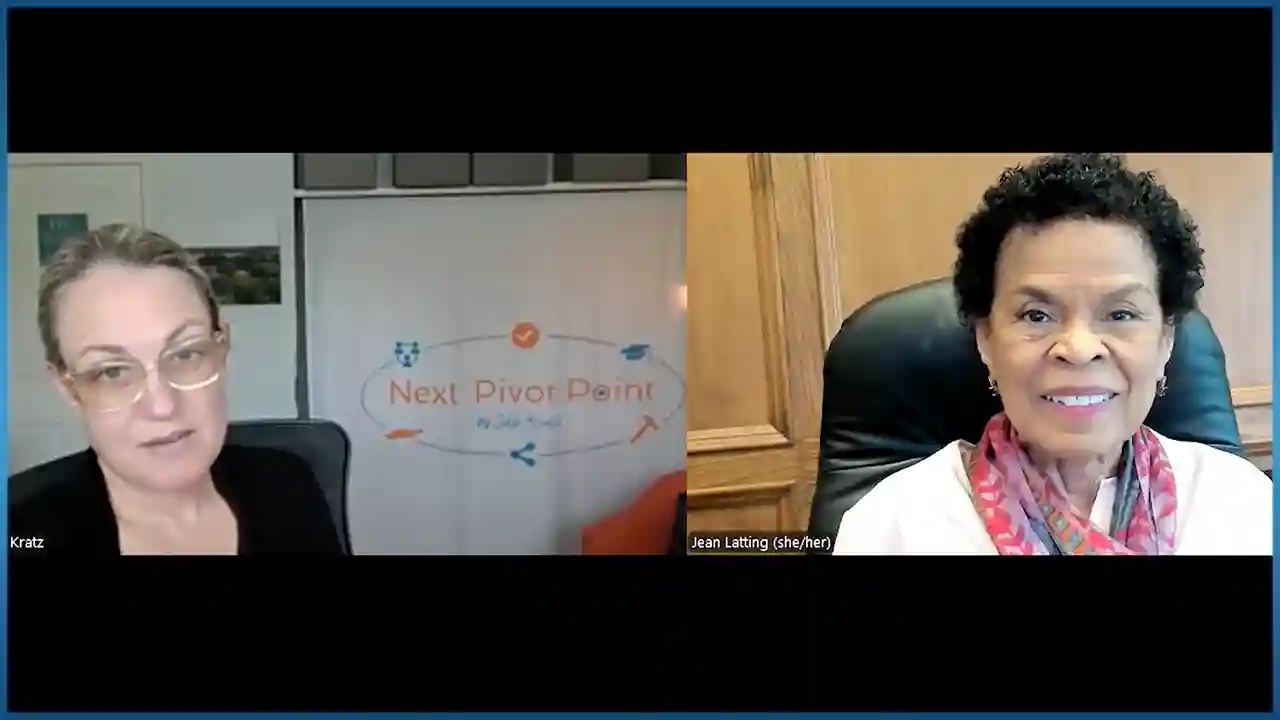


Jean Latting
Julie Kratz, a renowned expert in allyship, discusses strategies for fostering inclusive leadership and engaging those who are persuadable but uncertain.


Jean Latting
Dr. Beth Kaplan, in her introduction to her new book Braving the Workplace: “I know what it's like to be unseen, unheard and unhappy."


Jean Latting
Suneel Gupta will tell you that finding everyday dharma in the midst of a challenging life is not measured by outward success, nor by achievement, but by finding your essence.


Jean Latting
Instead of being shamed for an error you made, you were supported in redressing the situation. How did it affect your sense of responsibility and ownership?


Jean Latting
Jean sums up her history of optimism, the arc of social justice, and the deliberate steps one has to take to keep an eye on the prize.


Jean Latting
How do you self-identify? Our identities affect our allyship with those who are being marginalized because of one or more of their identities.


Jean Latting
Nina proposes susceptibility to harmful radiation and absorption of Vitamin D as the simple explanation for why people have different skin colors, a product of evolutionary adaptation.


Jean Latting
Brain fog is a trap we fall into when our emotional reaction to a negative experience keeps us frozen. If we don’t have tools to keep us moving, we get stuck where it hurts the most.


Jean Latting
Studies show the benefits of affirming our value, yet we hesitate to share these affirmations with others.


Jean Latting
Ilana Redstone says the Certainty Trap happens when we have moral principles we are 100% sure of and shut out any objections to the contrary.


Jean Latting
Research shows that groups who put in the effort to welcome diversity and promote inclusiveness may have more conflicts but are also more productive and innovative.


Jean Latting
After George Floyd's murder, Ronald McDonald House-Houston wanted to make a difference for their staff and also their families across the world.


Jean Latting
The polarization in this country has grown so vast that words we use in common do not mean the same things. Is there any hope for bridging the divide?


Jean Latting
Jean talks about three common breakdowns in email communications, how to handle them to avoid rework, and reduce stress and anxiety in the workplace.


Jean Latting
Jasmin has written about generational trauma and her own experiences with it as the child of American Black and Caribbean Black parents.


Carol Stewart
For Women’s Month, we wanted to share this blog for women everywhere who may have feared (as we have) that we are not good enough.


Jean Latting
Dr. Kira Banks talks about her work with internalized oppression, what she calls appropriated racial oppression.


Jean Latting
Jean asks André Harris about his sickle cell, his experience with sexual assault, and his ability to thrive where others might have given up.


Jean Latting
A barrier to racial understanding is the fear of exposing oneself. What if we could find a safe place to have these uncomfortable conversations?


Francine Derby
One young lawyer’s struggle to be accepted for who she is, why ADHD reveals a racial divide, and how to make differences work for everyone.


Jean Latting
Understanding high and low context is essential to communicating effectively in conversations.


Jean Latting
Who makes a better leader, an introvert or an extrovert? Jean interviews Carol Stewart, who has some unexpected things to say about it.


Jean Latting
Jean and Barry Regan explore how your understanding of your own culture affects the way you perceive the world.


Anonymous
Guest blogger this week describes the eye-opening moment when she went from judgmental to grateful and makes a good argument in favor of acceptance.


Jessica Kanzler
Jessica describes the moment when she went from judgmental to grateful, confronts her biases, and makes a good argument in favor of acceptance.


Samantha Wu
In Part 2 of our reflection on anti-Asian bias, we bring you Samantha Wu’s thoughtful post on her personal response to the Atlanta massacre.


Carole Marmell
Carole Marmell writes about how to stand with Asian Americans: what to know & show support to bridge difference.


Jean Latting
In this guest blog post, Jessica Kanzler shares how in her experience with higher education, unconscious bias is more subtle than overt.


Brandon Danowsky
Brandon Danowsky is this week’s guest blogger. He writes of the conflict between his Latino and White identities.


Jean Latting
Why do we seesaw so much in American political life? What happens that people want to change direction?


Jean Latting
Dr Barbara Love speaks about envisioning a world that benefits everyone, the power of transformation, and the plantation’s money box.


Jean Latting
If we want to overcome impostor syndrome, we must learn to remove our internal barriers and negative self-talk.


Jean Latting
What is antiracism? Here's a curated list of reliable sources of information on race and racism in the workplace


Amy Hageman
Struggling with how to respond to White fragility & privilege? Amy Hageman’s post will help you understand what happens behind the scenes & what works.